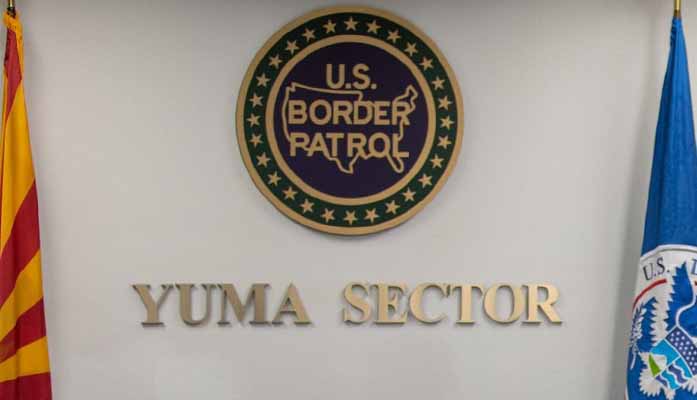
by Terri Jo Neff | Apr 6, 2022 | News
By Terri Jo Neff |
Three consumer taxes should be immediately suspended to help Arizonans deal with post-pandemic inflation, and two of those taxes should be abolished altogether, State Sen. Warren Petersen argues.
On Tuesday, Petersen (R-LD12) called for a temporary halt to Arizona’s 19 cents per gallon gasoline tax. He also wants to see the food tax and the residential rental tax not only suspended, but also eventually abolished.
Petersen doubled down on his proposal Wednesday, telling KFYI’s James T. Harris there is “no reason” his proposal cannot be implemented in light of Arizona’s more than $1 billion budget surplus. Especially with a Republican-controlled Legislature and a Republican governor.
“People are absolutely reeling from inflation right now but we have state and local governments that have more cash than they’ve ever had before,” Petersen said, adding that his proposal would bring “immediate relief to some of the people that need it the most.”
Suspending the gas tax until the end of 2022 would help Arizonans at the pump, Peterson explained. He added that the move could bring even further relief for consumers due to high gas prices being integrated into the cost of everything else people buy.
The state’s huge budget surplus is more than enough to supplant the $300-$350 million in gas tax revenues needed to fund transportation projects across the state, Petersen said.
While a gas tax holiday would be temporary, Petersen is calling on his fellow lawmakers to support a permanent end to the food tax in Arizona.
“That just hurts the poor more than anybody, and only some cities charge it,” Petersen told Harris.
As to his third suggestion of the abolishment of residential rental taxes, Petersen questioned why a special consumer tax is charged of those living in a rental unit.
“Nobody should charge this,” he argued. “People don’t pay a tax every single time they pay their mortgage, but yet tenants every single time they pay their rent they pay a tax on their rent.”
Petersen believes the time is right for Gov. Doug Ducey to call a special session so that lawmakers can provide immediate relief through the huge budget surplus.
“Let’s give it back to the taxpayers,” he said.
LISTEN TO SEN. PETERSEN HERE

by Corinne Murdock | Apr 6, 2022 | Education, News
By Corinne Murdock |
Nearly five months ago, a group of mothers publicized a Google Drive dossier on them and other parents perceived as political enemies, compiled by the father of their Scottsdale Unified School District (SUSD) board president, Jann-Michael Greenburg. The trove of political opposition research leaked by SUSD mother Amanda Wray quickly made international news, and became known as the “Greenburg Files,” or “Greenburg Dossier.” Jann-Michael’s father, Mark Greenburg, didn’t shy away from the uproar that ensued.
In January, Greenburg filed an initial complaint in the Maricopa County Superior Court against the Wrays for defamation, as well as violations of the Computer Fraud and Abuse Act (CFAA). Several weeks later, Greenburg amended his complaint to only sue for CFAA violations, striking all claims of defamation. Reporting on his lawsuit was featured in one place: the Arizona Republic, behind a subscriber-only paywall. In response, the Wrays issued a motion to dismiss, claiming that Greenburg had ulterior motives aligned with SLAPP behavior: “strategic lawsuits against public participation” to silence free speech.
A status conference is scheduled for Wednesday at 9:30 am. A scheduling conference is also scheduled for May 19 at 3 pm. The requested relief totals nearly $10,000.
Greenburg is represented by attorney Christopher Rapp of Ryan Rapp Underwood & Pacheco. Amanda and Daniel Wray are represented by John Wilenchik of Wilenchik & Bartness and acclaimed GOP chairwoman and attorney Harmeet Dhillon with her law group. Judge Joan Sinclair is listed as hearing the case.
Greenburg’s lawsuit characterized Amanda Wray as a “political operative,” pointing to the private Facebook group she organized, “SUSD-CAN,” short for “Scottsdale Unified School District Community Action Network,” a parent and community advocacy group concerning SUSD issues like masking, vaccinations, LGBTQ+, and critical race theory (CRT). He alleged that Wray stole his private information and documents by accessing the dossier, and that she doxxed him by publishing and discussing his home address, license plate, and Paycheck Protection Program loan information on the Facebook group page.
The lawsuit explained that Greenburg shared access to his server, or Google account on which the dossier was located, with three other individuals, one of whom he identified as his son, Jann-Michael. Greenburg insisted that the Google Drive dossier was otherwise password protected. He claimed that inadvertent public access to the dossier was granted through a setting unknown to him at the time enabling third parties to access the server without a password: the use of the Google Drive’s URL. Jann-Michael inadvertently shared that URL with SUSD parents in an emailed response to defamation accusations by including 13 screenshots of public Facebook comments stored within the dossier, one of which included the URL.
“The situation was the equivalent of Plaintiff’s son accidentally disclosing his username and password,” read the complaint.
Wray was accused of intentionally breaching the Google Drive dossier by using a third party to create a hyperlink with the inadvertently-shared URL. Greenburg also accused Wray of copying, deleting, adding, reorganizing, and renaming files on his server. He estimated that she caused him a loss amounting to at least $5,000.
The Wrays’ motion to dismiss insisted that Greenburg failed to state a claim in which relief can be granted. They rejected claims that the Google Drive in question was made private, noting that Jann-Michael shared a publicly accessible URL that only needed to be typed into a web address bar to be accessed. They added that Daniel couldn’t be roped into the lawsuit because claims of “ratify[ing]” Amanda’s access to the dossier weren’t proof of liability.
“Amanda cannot be liable for criminal ‘computer hacking’ just for clicking a hyperlink created by a third party (who is not a party to this action) to the URL for Greenburg’s Google Drive that Greenburg’s son published for anyone to see and use,” read the motion to dismiss.
In a follow-up reply to Greenburg’s response to their motion to dismiss, the Wrays’ attorneys again questioned his motives for suing after challenging the truthfulness of his claims. They characterized his lawsuit as a continuation of the dossier.
“This lawsuit is the latest, and hopefully last, chapter in Greenburg’s unlawful harassment and intimidation campaign against Ms. Wray and SUSD parents in retaliation for their advocacy regarding the SUSD school board,” wrote the Wrays’ attorneys. “[T]his lawsuit was brought to deter or prevent Ms. Wray from exercising her constitutional rights and right to petition [and] intended to harass and/or cause unnecessary delay or needless increase in the cost of litigation[.]”
In mid-February, a third-party forensic investigation carried out by Loehrs Forensics determined that neither the SUSD email server or four personal computers issued by SUSD were used to create, access, modify, or share the Google Drive folder containing the dossier.
Law enforcement cleared the Greenburgs of any wrongdoing. Scottsdale Police Department (SPD) determined in December the dossier didn’t violate any laws because it contained open source and public documents only. Attorney General Mark Brnovich asked the Department of Justice (DOJ) to investigate nonetheless, positing that Jann-Michael may have conspired to wield his power over parents. AZ Free News inquired with Brnovich’s office if any DOJ investigation ever took place. They didn’t respond by press time.
As AZ Free News reported, Jann-Michael admitted to having a history of sharing computers with his family members. He was also listed as one of the individuals who had editing access to the dossier.
The SUSD board voted to demote Jann-Michael from president to regular board member last November.
Corinne Murdock is a reporter for AZ Free News. Follow her latest on Twitter, or email tips to corinne@azfreenews.com.

by Corinne Murdock | Apr 6, 2022 | Education, News
By Corinne Murdock |
In February, leadership within the University of Arizona (UArizona) sciences published papers championing an old claim made by the Chinese government: that COVID-19 originated naturally at a Chinese wet market. Also behind those papers were researchers intimately steeped in government efforts to prove that COVID-19 didn’t leak from a lab whose research on coronaviruses was funded by the government — the Wuhan Institute of Virology in Wuhan, China.
UArizona Ecology & Evolutionary Biology Department Head Michael Worobey and PhD student Lorena Malpica Serrano co-authored two papers alongside 34 scientists to claim that COVID-19 came from two encounters with animals at a wet market. One of those scientists, virologist Robert Garry, was hand-selected by NIH director Francis Collins to dispute whistleblower research from summer 2021 that COVID-19 was engineered at the Wuhan Institute of Virology eight miles from the Huanan Seafood Wholesale Market. Another scientist, Netherlands molecular expert Marion Koopmans, served on the World Health Organization (WHO) mission in early 2021 to analyze the origins of COVID-19 in Wuhan — a mission that concluded with a report blaming wet market animals that was fraught with errors, rejected by WHO leadership, haunted by claims of Chinese government interference, and ultimately walked back on by several mission members.
Over the last year, Worobey has researched for a connection between COVID-19 and the Chinese wet market. Last March, Worobey teamed up with four other researchers to posit in a paper that COVID-19 wasn’t the first coronavirus outbreak among humans — three of those researchers, University of California in San Diego scientists Jonathan Pekar, Niema Moshiri, and Joel Wertheim joined him on the two papers published most recently. That paper claimed that an earlier variant successfully jumped from animals to humans between mid-October and mid-November of 2019. Worobey and his peers largely dismissed the notion that COVID-19 originated at the Huanan Seafood Wholesale Market.
“The first described cluster of COVID-19 was associated with the Huanan Seafood Wholesale Market in late December 2019, and the earliest sequenced SARS-CoV-2 genomes came from this cluster,” read the report. “However, this market cluster is unlikely to have denoted the beginning of the pandemic, as COVID-19 cases from early December lacked connections to the market. The earliest such case in the scientific literature is from an individual retrospectively diagnosed on 1 December 2019. Notably, however, newspaper reports document retrospective COVID-19 diagnoses recorded by the Chinese government going back to 17 November 2019 in Hubei province. These reports detail daily retrospective COVID-19 diagnoses through the end of November, suggesting that SARS-CoV-2 was actively circulating for at least a month before it was discovered.”
Then last November, eight months after the collaborative March paper, Worobey appeared to believe more greatly that the wet market was the origins for COVID-19. He published a solo paper examining available records to link the virus to the wet market. It appears that three months after that solo paper, less than a year after dismissing the notion that the wet market was the origin of COVID-19, Worobey and several of his colleagues came to completely flip on their prior findings.
Their latest paper was picked up by the New York Times as a feature story. The acclaimed preprint recounted how the scientists studied a plethora of data, including virus genes, market stall maps, and social media activity of the earliest COVID-19 patients following several weeks in 2019 at the Huanan wet market. However, the Times noted that the papers didn’t identify the market animal that spread COVID-19 to humans.
In fact, no American or Chinese scientists were able to test the market animals claimed to be the cause of the COVID-19 outbreak; before anyone could, Chinese police shut down and disinfected the market. Only after Chinese police finished their work were scientists with the Chinese Center for Disease Control and Prevention able to come test the area. Since there were no market animals left, the researchers sampled market interiors and stray animals. That was in January 2020. The Chinese scientists sat on this collected evidence until several months ago, a day before Worobey’s report at the end of February. The Chinese government’s report conflicted with the Worobey papers, noting that the sampled animals were negative for the virus and that all evidence of COVID-19 was found in relation to human activity in the surrounding environment.
In the year prior to Worobey and his colleagues advancing the argument that COVID originated from the wet market, an outside researcher attempted to enlighten the conflicting narratives. This scientist claimed in a paper that the virus was engineered in a lab within miles of the wet market.
As Vanity Fair reported, evolutionary biologist Jesse Bloom authored his standalone paper after discovering the disappearance of several Chinese papers detailing several SARS-CoV-2 genomic sequences. The sequences are like points on a sequential map, allowing scientists to track the origins and evolution of a virus. Bloom suspected that the Chinese government destroyed evidence of the genomic sequences because they engineered the COVID-19 virus. His further investigation caused him to believe that the National Institutes of Health (NIH) deleted evidence as well at the behest of the Chinese government. Bloom passed his findings laid out in the paper on to Dr. Anthony Fauci and Collins.
Bloom’s paper was with contention from outside experts brought forth by Collins in a meeting: an evolutionary biologist, Kristian Andersen, and the virologist involved in Worobey’s latest papers, Robert Garry. Andersen accused Bloom of unethical behavior for daring to investigate something that Chinese scientists deleted. Andersen insisted that the genomic sequences from Wuhan were of no concern.
Fauci sided with Andersen. He vouched for the Chinese scientists’ integrity, noting that their reasons for deleting the sequences were unknown. Yet, both he and Collins didn’t agree with Andersen when he pressured Bloom to allow edits to his paper.
As the Vanity Fair article outlined, Fauci and Collins had a vested interest to support the notions of natural transmission, not a lab leak, because of their relationship with EcoHealth Alliance — the nonprofit research organization that funded the coronavirus bat research at the Wuhan Institute of Virology. Emails obtained through public records requests revealed that EcoHealth Alliance CEO Peter Daszak thanked Fauci for dismissing lab leak theories, with Fauci responding in kind.
Corinne Murdock is a reporter for AZ Free News. Follow her latest on Twitter, or email tips to corinne@azfreenews.com.

by Corinne Murdock | Apr 5, 2022 | News
By Corinne Murdock |
On Monday, the Senate approved legislation protecting the First Amendment rights of homeowners in the face of attempted restrictions from condominium unit owner’s associations (COA) or homeowner’s associations (HOA).
HB2158 protects a homeowner’s ability to display association-specific political signage, assemble peaceably in common areas, post notices about assemblies, and invite a political candidate or guest to speak at an assembly. The bill now heads to the governor for final approval.
The Senate passed the bill without any remarks, done so unanimously as did the House last month.
Specifically, HB2158 would bar COAs and HOAs from prohibiting or limiting association-specific political signage during distribution of ballots until three days after the election, as well as regulating the manufacture of the signage.
Corinne Murdock is a reporter for AZ Free News. Follow her latest on Twitter, or email tips to corinne@azfreenews.com.

by Corinne Murdock | Apr 5, 2022 | News
By Corinne Murdock |
On Monday, Senator Mark Kelly (D-AZ) announced that he would vote to approve Judge Ketanji Brown Jackson, President Joe Biden’s nominee for the vacant Supreme Court (SCOTUS) seat. Kelly said that he supported all of Jackson’s record on case rulings, which likely included the slew of controversial criminal judgments that gave lenient sentencing to violent criminals.
“After speaking with Judge Jackson and reviewing her record and approach to deciding cases, I believe her to be very well qualified and having demonstrated a commitment to fairly interpret and uphold the Constitution on our nation’s highest court,” said Kelly.
On Sunday, a day before Kelly’s announcement, the New York Post reported that one of the convicted child rapists who’d received lowered sentencing twice from Jackson had been arrested for assault. Sex offender Leo Weekes received one year in prison with credit for time served for failing to register as a sex offender, a classification he earned for raping his 13-year-old niece four years earlier. Jackson’s sentence allowed Weekes to be released five months later. The federal guideline minimum for Weekes’ crime would have been two years in prison. A year later, Weekes was arrested for the attempted sexual assault of his sister-in-law, though she dropped the charges; prosecutors claimed that Weekes paid her off. Several years later, Weekes was back in court for failing to register as a sex offender and violating multiple stipulations of his probation, again coming before Jackson. Again, Jackson gave Weekes a punishment lower than what the guidelines suggested: a 24-month sentence overlapping with his punishment for the previous assault conviction.
As the New York Post report noted, the Weekes case was not included among the seven cases given to the Senate Judiciary Committee for consideration. The requested cases were to clarify Jackson’s habit of sentencing below federal guidelines and the requests of prosecutors.
A day prior, the New York Post also broke the story that Jackson gave lenient sentencing to those convicted of multiple counts of child torture during hearings on eight child porn cases. For those cases, Jackson argued against applying recommended sentencing because she disagreed with the relevance, severity, and logic of child pornography law. Like with Weekes, Jackson reduced one defendant’s original sentence of 60 months, the mandatory minimum that fell under the average sentence of 81 months for similar cases, by giving him credit for time served, thereby reducing his sentence to 38 months.
To another defendant last year charged with child porn distribution, Jackson expressed sympathy and called family members’ letters portraying the defendant in a positive light, “mitigating factors.” Jackson said she wasn’t persuaded by the prosecution’s display of the more “egregious or extreme” child porn distributed by the defendant.
Jackson also advocated for the release of all those imprisoned in Washington, D.C., at the start of the pandemic. She managed to grant several releases to those charged with or convicted of major crimes, such as the member of a fentanyl trafficking ring and a serial bank robber.
Despite this track record, Senate Judiciary Committee Democrats portrayed Jackson as tough on crime.
Corinne Murdock is a reporter for AZ Free News. Follow her latest on Twitter, or email tips to corinne@azfreenews.com.

by Terri Jo Neff | Apr 4, 2022 | News
By Terri Jo Neff |
Federal, state, and local law enforcement officials across the southwestern U.S. border are preparing for an unprecedented number of non-U.S. citizens crossing into the country in May, thanks to a recent White House announcement about Title 42.
One of those officials is Chris T. Clem who took over in late 2020 as chief of the USBP’s Yuma Sector, a 181,670 square mile area along the 126 miles of U.S. / Mexico border between California’s Imperial Sand Dunes and the Yuma – Pima county line.
Clem brought 25 years of agency experience with him, including time with the El Paso Sector. But nothing could prepare him for the challenges he and his team would experience just one year later.
In early December 2021, Yuma Mayor Douglas Nicholls declared a state of emergency after USBP Yuma Sector agents apprehended 6,000 people in five days. It was the same number of apprehensions the Sector made in an average month, and many others were able to get past the overwhelmed agents.
On one weekend in mid-December, Clem announced more than 2,600 undocumented non-U.S. citizens (UNCs) had been encountered . There have also been multiple water rescues the last few months from the Salinity Canal, which has a swift current and steep banks putting agents at great risk.
While the current apprehensions in Yuma Sector are no longer breaking records, Clem’s agents have continued to stop UNCs from getting into the country. Many have been violent criminals, such as Omar Martinez-Gomez, a Mexican national arrested in March after it was determined he had been convicted of aggravated assault domestic violence for strangling his pregnant girlfriend.
Also apprehended last month was Carlos Enrique Naranjo Angel for illegally entering the U.S. after agents discovered Angel, 48, was previously convicted of sexual conduct with a child age three or under.
But come May 23, all bets could be off if the Biden Administration follows through on threats to lift Title 42 authority at the border. Title 42 of the U.S. Code has, since the 1890s, given federal public health officials power to take extraordinary measures during a pandemic to limit the introduction of communicable diseases.
Former President Donald Trump, through the Centers for Disease Control and Prevention, invoked the authority in March 2020 as a way to slow COVID-19 at the U.S.-Mexico border by permitting border officials to deny entrance to anyone trying to enter the country. Reports show that more than 1.7 million people have been turned away under Title 42 authority.
The recent decision to forgo Title 42 was made after “considering current public health conditions and an increased availability of tools to fight COVID-19 such as highly effective vaccines and therapeutics,” the CDC stated. Now, federal, state, and local officials fear the number of UNCs trying to get into the U.S. along the entire southwestern border will jump from about 7,000 per week to that many or more per day.
U.S. Senator Kyrsten Sinema has called on President Joe Biden to not end the Title 42 directive until a “firm, workable plan” is in place. Doing so without a comprehensive plan will put Arizonans as well as immigrants at risk, the Senator said.
Last month, the Chief and Sinema took part in a virtual roundtable with federal and non-governmental organizations to discuss solutions to the border crisis. Clem also spoke with Sinema about the resources which will be needed to manage the flow of immigrants.
“I’m grateful for Chief Clem’s work in keeping Arizona communities safe, and I will continue working with him and all of our partners on the ground on identifying solutions to strengthen our border security and ensure migrants are treated fairly and humanely,” said Sinema, Chair of the Senate Border Management Subcommittee.
USBP is part of U.S. Customs and Border Protection, which is now headed by former Tucson Police Chief Chris Magnus. In turn, Magnus reports to U.S. Homeland Security Secretary Alejandro Mayorkas.






